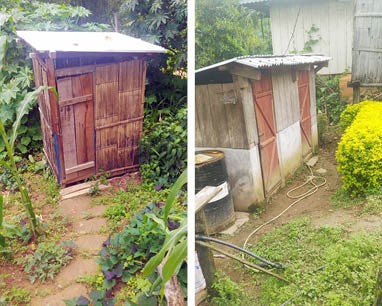64 households in Ekhao village attained ODF status in 2015 though it was not declared then.

Morung Express News
Tuensang | July 3
With the vision to achieve ‘Open Defecation Free’ (ODF) India, the Swachh Bharat Mission was launched on October 2, 2014 throughout the country. The leaders of the county set the goal to achieve ODF India by October 2, 2019.
Following this vision and with the intervention of the Land Resources Department (LRD), Tuensang, 64 households in Ekhao village attained ODF status in 2015, though it was not declared. Ekhao village is a hamlet inhabited by the Khiamniungan in the Eastern part of Nagaland.
Narrating the ODF success story, an officer from the Land Resources said that during the Participatory Rural Appraisal (PRA) exercise, which is mandatory for any program to be implemented, the department visited Ekaho village.
“During the visit, some of our staff wanted to use toilet but to our surprise the villager took us to a nearby village as there was no toilet in Ekaho village. We figured out that Ekhao was amongst the 40% of rural household in India where there is no access to toilet according to National statistic official survey in 2012,” the officer stated.
“Convincing the villagers was one of the toughest issues initially,” shared Victoria, a staff of LRD Tuensang. It is understood that “open defecation and the issue of rearing pigs has to go hand in hand. Pigs were reared in the open and doing the job of cleaning all human faeces and therefore, if pigs were reared in pigsty, the village will be more unhygienic with human faeces all over with no one on the job. It was also considered more taxing to construct pig sty.”
Upon educating the villager on health and hygiene, elders and leaders of the village accepted the proposal of the department to construct toilet in every house hold within a year’s time. The agreement was arrived at with a condition that the department and the villagers will share the cost of the toilet seat equally.
“The department provided three pieces of CGI sheet, a sum of Rs 200 to buy nails for pigsty to each household in the village,” the officers informed.
Council chairman of Ekhao, Putu remarked, “It is like dream when we think of the past as we did not have toilet in the village. If the department of Land Resources were not there, we may still be living unhygienic.”
On the lighter side, the council chairman said, “Before we had toilets and pigs were reared in the open, the LRD staff used to inform us in advance not to cook pig from the village. They preferred vegetable diet and we use to think it is very rare to find Nagas not consuming pork and only now we know why the staff abstained from taking pork in the village during those days.”
Members of the village council also said the hygiene and benefit of using toilet and rearing pig in pigsty in the village has set an example to all the villages in the entire range. After Ekhao, all the elders and leaders of all surrounding village started to emulate our practice and now we are more hygienic and free from most of the sickness during the entire season, they added.






